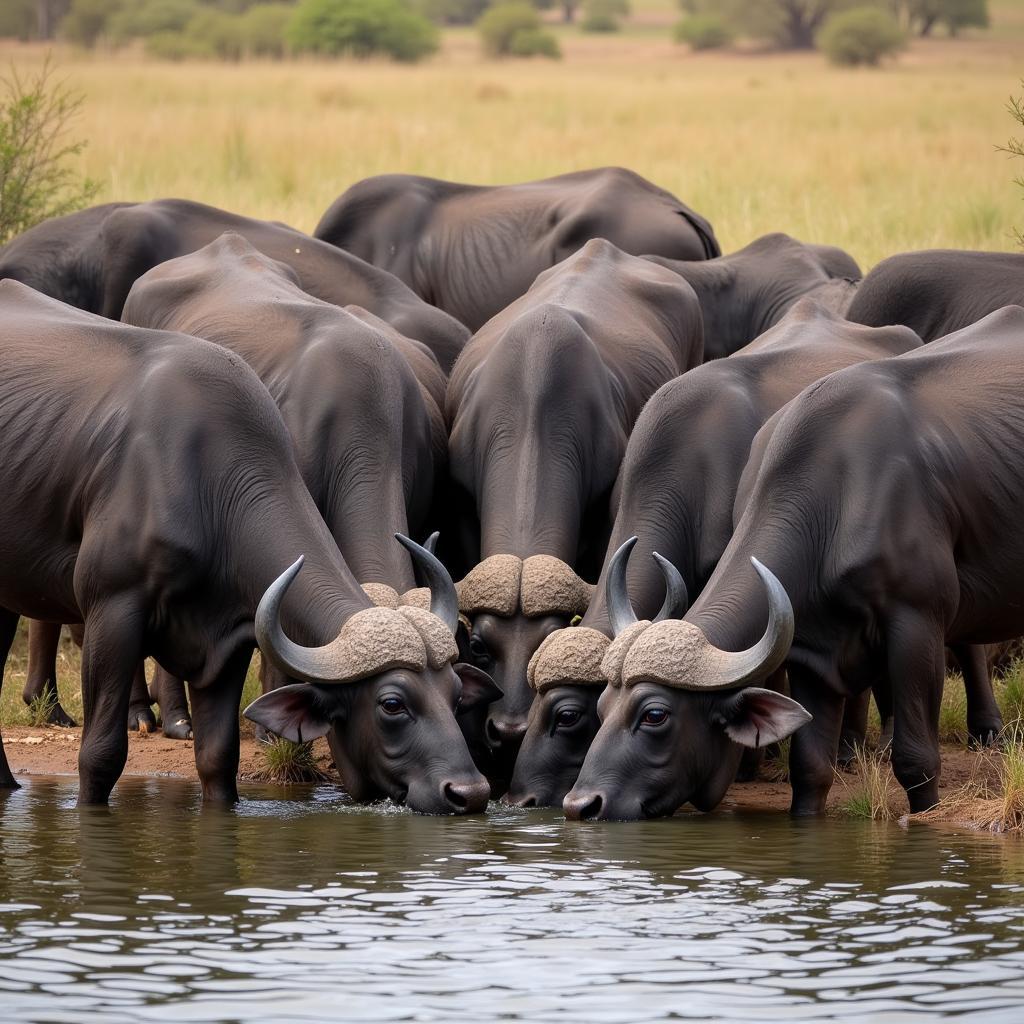The African Buffalo Diet: A Look at What Makes this Powerful Grazer Thrive
The African buffalo, a powerful grazer found throughout sub-Saharan Africa, is a sight to behold. These impressive creatures play a crucial role in their ecosystem, and understanding the African Buffalo Diet is key to appreciating their significance. From the plains of the Serengeti to the lush grasslands of the Congo Basin, let’s explore the eating habits of this iconic African herbivore.
What Does an African Buffalo Eat?
African buffalo are herbivores, meaning their diet consists entirely of plant matter. They are known as “grazers,” with a strong preference for grass. In fact, grass makes up the bulk of their diet, comprising up to 95% of their food intake. They are particularly fond of the shorter, sweeter varieties found in abundance in their natural habitats.
The Importance of Grass in the African Buffalo Diet
Grass provides several essential nutrients for the African buffalo’s survival:
- Fiber: Essential for their digestive system, aiding in the breakdown of food.
- Carbohydrates: The primary source of energy for these large animals, fueling their daily activities.
- Protein: Found in varying amounts depending on the type and maturity of the grass, crucial for growth and muscle development.
Beyond Grass: Supplementing the Diet
While grass forms the foundation of their diet, African buffalo will occasionally supplement their meals with other plant matter, especially during the dry season when grass is less plentiful.
Other Plants Consumed by African Buffalo:
- Leaves: They browse on leaves from trees and shrubs, adding variety and additional nutrients to their diet.
- Fruits: When available, they will consume fallen fruits for a sugary energy boost.
- Bark: In times of scarcity, they may strip bark from trees, though this is less common.
 African Buffalo at Waterhole
African Buffalo at Waterhole
The Importance of Water
Water is crucial for the survival of African buffalo, especially considering their diet. They need to drink regularly, especially during the dry season, to stay hydrated and aid in digestion. Their water requirements are high due to the sheer volume of grass they consume, and they are often found near water sources like rivers and lakes.
African Buffalo Diet and Their Ecosystem
The African buffalo’s grazing habits significantly impact their environment. They play a vital role in shaping the landscape and influencing plant diversity.
Ecological Impacts of the African Buffalo:
- Grazing Control: Their feeding helps to control grass growth, preventing the dominance of certain species and promoting biodiversity.
- Seed Dispersal: As they graze, they pick up seeds on their fur and hooves, spreading them across the landscape and aiding in plant reproduction.
- Nutrient Cycling: Their dung returns essential nutrients to the soil, fertilizing the ground and supporting plant growth.
Adapting to Change: The Resilient Grazers
African buffalo are highly adaptable grazers. Their diet, while primarily focused on grass, allows them to survive in a variety of habitats, from open savannas to wooded areas. They are a testament to the resilience of nature and the interconnectedness of all living things within an ecosystem.
FAQs About the African Buffalo Diet
1. Are African buffalo dangerous?
While they are herbivores, African buffalo are wild animals and can be extremely dangerous, especially when threatened. They are known for their unpredictable behavior and have a reputation for being one of the most dangerous animals in Africa.
2. What eats African buffalo?
Lions, crocodiles, and spotted hyenas are the main predators of African buffalo, typically targeting calves or weaker individuals.
3. How do African buffalo digest grass?
Like other ruminants, African buffalo have a four-chambered stomach that allows them to break down the tough cellulose in grass through a process of fermentation.
4. Do African buffalo migrate?
Yes, many populations of African buffalo undertake seasonal migrations in search of water and better grazing grounds. These migrations can be spectacular events, involving thousands of animals.
Exploring More about the African Buffalo
To learn more about the African buffalo and their fascinating lives, check out these articles:
Understanding the African buffalo diet provides a window into the intricate web of life in Africa. These magnificent creatures, with their powerful presence and essential role in their ecosystem, remind us of the importance of preserving the delicate balance of nature.
If you have any questions or need further assistance, please do not hesitate to contact us. You can reach us at +255768904061, email us at kaka.mag@gmail.com or visit our office in Mbarali DC Mawindi, Kangaga, Tanzania. Our dedicated customer support team is available 24/7 to assist you.

